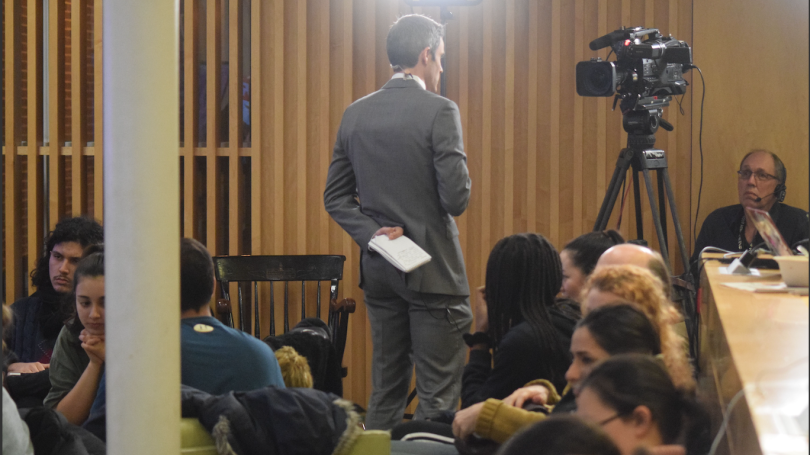
- Public Policy
- Leadership
- Funding
- News & Events
- About the Center
Back to Top Nav
Back to Top Nav
Back to Top Nav
Back to Top Nav
On the evening of February 11, 2020, students, faculty, and community members convened in the TV Lounge at the Collis Center for Student Involvement to watch and discuss coverage of the New Hampshire presidential primary. “Rocky’s Most-Watched Watch Party for Dartmouth Students,” co-sponsored by the Rockefeller Center and the Collis Governing Board, included opening remarks, a raffle for students who voted that day, and participation from ABC News Live, which covered the primary from Collis. As election results from around the state were processed, students and community members enjoyed pizza and discussed their thoughts and predictions on the potential victor.
Justin Anderson, Dartmouth’s Vice President for Communications, who delivered the evening’s opening remarks, provided insight into how much political news coverage has changed over the course of the past 20 years. A self-proclaimed “recovering news addict,” Anderson worked at ABC News until 2011 as a reporter, assignment editor, and senior producer. Inspired by Timothy Crouse’s book “The Boys on the Bus,” which recounts life on the road for reporters covering the 1972 presidential elections, Anderson himself took to the road in 2000 to cover former Senator John McCain’s presidential campaign and explore the primary process. Describing the critical year as “one foot in the 20th century, one foot in the 21st century,” Anderson noted several technological advances that were key to McCain’s success, including the campaign’s innovative use of the Internet to collect donations from supporters and the use of videos to release media directly from the campaign. Anderson also highlighted the importance of McCain’s personability, noting that the candidate went above and beyond in states like New Hampshire where local expect candidates to “go out and shake hands” on a regular basis.
Looking at Dartmouth as a microcosm for how campaigns have changed since 2000, Anderson also emphasized the increasing difficultly of attracting candidates for more policy-oriented discussions when they would rather interact with voters “on their terms” through rallies. Since 2000, when Dartmouth hosted back-to-back Republican and Democratic debates, the College has co-hosted a Democratic presidential debate in 2008 and a Republican presidential debate in 2011, both held in Spaulding Auditorium (the latter of which Anderson helped organize). More recently, Dartmouth hosted a talk with then-candidate John Kasich in Collis Common Ground with MSNBC’s Morning Joe in 2016. Considering Dartmouth’s future involvement in the primary process, Anderson says that it is now difficult to get candidates “to have substantive conversations they cannot control,” showing “a change in the media landscape” where candidates would rather work with media they can actually control than have to answer “tough questions.”
Anderson concluded that students should never forget that “active engagement as an American citizen” will always matter. As the night unfolded, students witnessed this firsthand, as Senator Bernie Sanders and Pete Buttigieg took a close first and second place on the Democratic side, followed by Senator Amy Klobuchar, Senator Elizabeth Warren, and former Vice President Joe Biden (respectively). On the Republican side, President Donald Trump took victory, while former Governor Bill Weld came in second place with 9.1% of the vote. Now that the people of New Hampshire have done their civic duty, the state can watch the rest of the country do the same.
-Written by Shawdi Mehrvarzan ’22, Rockefeller Center Student Program Assistant for Public Programs